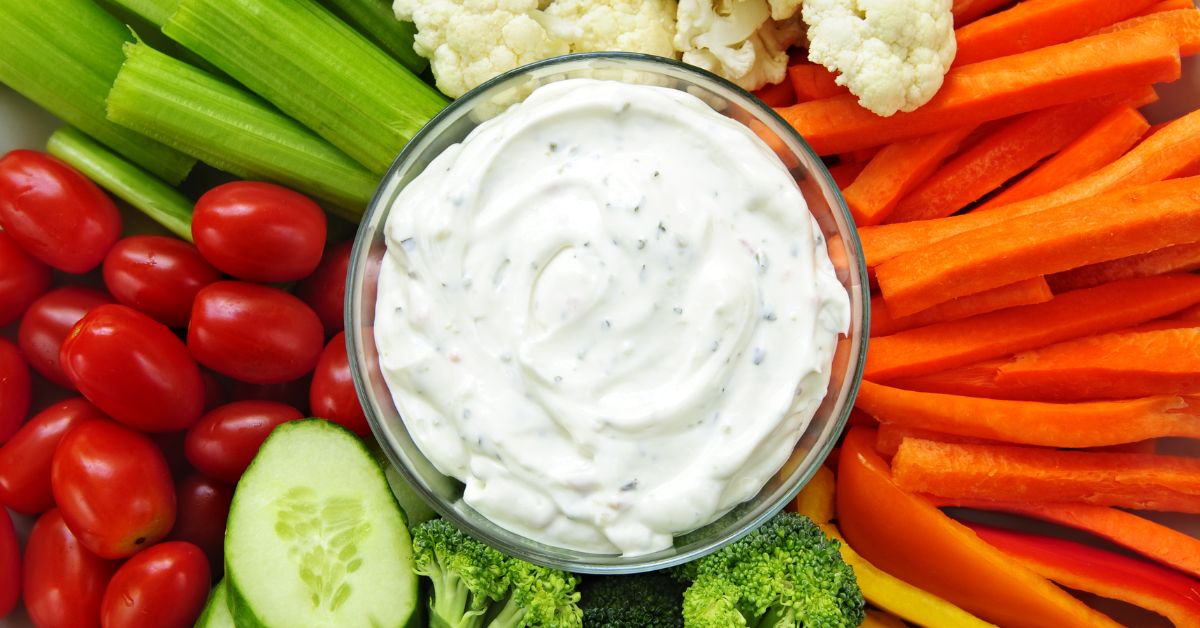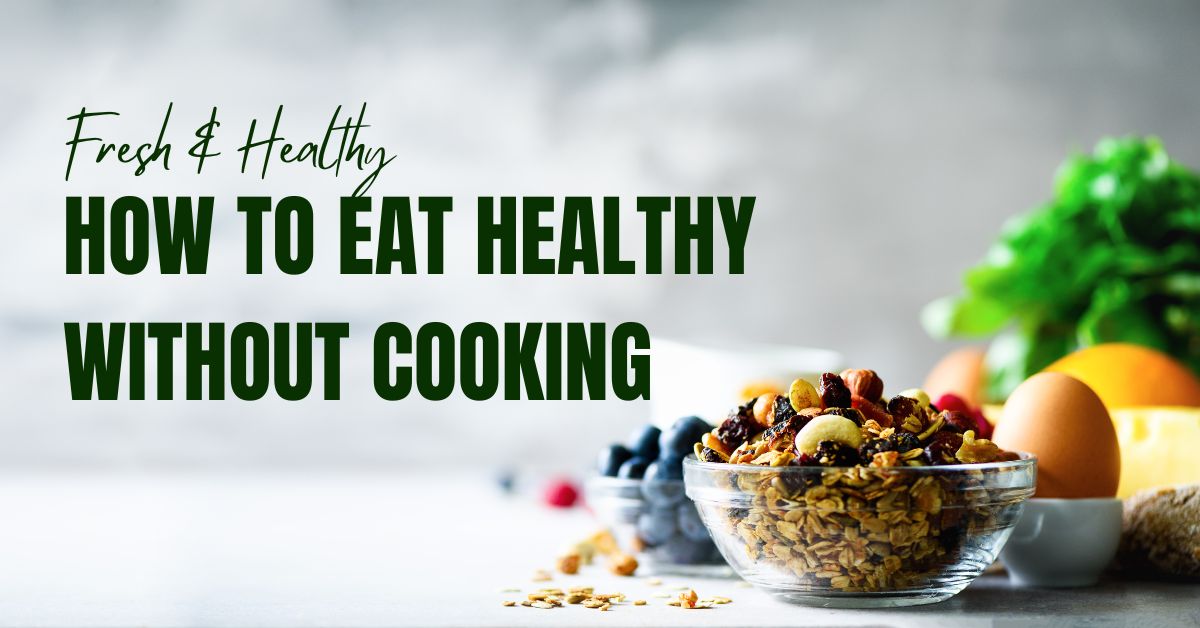Introduction
In today’s fast-paced world, finding time to cook healthy meals can be a challenge. Whether you’re a busy professional, a student, or simply not a fan of the kitchen, the quest to eat healthy without cooking is a common one. Fortunately, it’s entirely possible to maintain a nutritious diet even if you’re not a culinary expert. This article will explore various tips and tricks to help you achieve just that. We’ll delve into creative solutions, meal planning, and more, all centered around focusing on how to eat healthy without cooking.
The Importance of Healthy Eating

Before we dive into the tips and tricks, it’s crucial to understand the significance of maintaining a healthy diet. Eating healthy is fundamental for your overall health and well-being. It provides the body with essential nutrients, energy, and helps prevent a range of chronic diseases. When we prioritize nutrition, we’re investing in our long-term health.
Eating Healthy Without Cooking: Why It Matters

Now, let’s address why eating healthy without cooking is essential. Many people may not have the time or skills to prepare elaborate meals regularly. However, this doesn’t mean they should compromise on their health. By making smart choices, even those who don’t cook can ensure their diet is both nutritious and delicious.
Plan Your Non-Cooking Meals

One of the key strategies for eating healthy without cooking is planning your meals. This approach can save time and help you make more nutritious choices.
Here’s how you can do it:
- Daily or Weekly Meal Plans: Take some time to plan your meals for the week. Include a variety of food groups like fruits, vegetables, lean proteins, and whole grains. This ensures you get a balanced diet.
- Convenient Meal Delivery Services: Consider subscribing to meal delivery services that offer healthy, pre-made meals. They provide a convenient way to enjoy nutritious food without any cooking involved.
- Batch Cooking: On days when you do have time, prepare larger portions of non-cooked meals that can be refrigerated or frozen for later. This can include salads, fruit bowls, and sandwiches.
Stock Up on Healthy, No-Cook Ingredients

Maintaining a well-stocked pantry and fridge with no-cook essentials is vital for a successful non-cooking meal plan. Some key ingredients to have on hand include:
- Fresh Fruits and Vegetables: They contain lots of vitamins, minerals, and fiber. You can have them as snacks or in salads.
- Canned or Pouched Protein: Items like canned tuna, salmon, or pouches of chicken can be added to salads for a protein boost.
- Greek Yogurt: A great source of protein and probiotics, it can be enjoyed with fruits, honey, or nuts.
- Hummus and Nut Butters: Excellent for dipping veggies or spreading on whole-grain bread.
- Whole Grains: Stock up on items like whole grain bread, crackers, and cereals for a quick and healthy meal base.
- Nuts and Seeds: These make for a satisfying and nutritious snack.
- Dried Fruits: Perfect for adding natural sweetness to your meals or snacks.
Exploring Pre-Packaged Healthy Meals

For those who prefer convenience, pre-packaged healthy meals are a great option. Look for items with minimal processing and clean ingredient lists. These meals often come in microwaveable containers, making them perfect for on-the-go or office lunches.
Opt for Nutrient-Rich Snacks

Snacking doesn’t have to be unhealthy. In fact, it can be an opportunity to boost your nutrient intake. Here are some ideas for healthy snacks:
- Fresh Fruit: Sliced apples, berries, and banana chips make for delicious, no-fuss snacks.
- Veggies with Dip: Carrot sticks, cucumber slices, and bell pepper strips pair well with hummus or yogurt-based dips.
- Protein Bars: Look for bars with a balance of protein, fiber, and healthy fats.
- Trail Mix: Create your own mix of nuts, seeds, and dried fruits for a satisfying snack.
- Smoothies: Blend fruits, leafy greens, Greek yogurt, and a scoop of protein powder for a nutritious and filling drink.
Dining Out the Healthy Way

Dining out doesn’t mean giving up on your healthy eating goals. Here are some tips for dining out without cooking:
- Salads: Opt for salads with lean protein like grilled chicken or tofu. Pay attention to dressings and toppings that are high in calories.
- Grilled Options: Choose grilled rather than fried dishes when available.
- Sides and Appetizers: Sometimes, a combination of healthy appetizers can make a satisfying meal. Consider ordering a variety of veggie sides or appetizers.
- Customize Your Order: Don’t be afraid to ask for substitutions or modifications to suit your dietary preferences. Most restaurants are accommodating.
- Portion Control: Be mindful of portion sizes, especially at restaurants known for large servings.
Healthy Drinks to Complement Your Meals

Keeping yourself well-hydrated is a key part of eating healthily. Opt for beverages that enhance your nutrition rather than detract from it. Here are some ideas:
- Water: Of course, water is the best choice. It has no calories and is vital for your overall well-being.
- Herbal Tea: Herbal teas like chamomile, peppermint, or green tea are not only hydrating but also provide various health benefits.
- Fruit-Infused Water: Add slices of fresh fruit, such as lemon, lime, or berries, to your water for a burst of flavor.
- Smoothies: As mentioned earlier, smoothies can be a nutritious meal or snack.
- 100% Fruit Juice: In moderation, a small glass of 100% fruit juice can provide essential vitamins. Simply be cautious about the amount of sugar it contains.
Eating Healthy on a Budget

Eating healthy without cooking can be budget-friendly with the right approach. Here are some money-saving strategies:
- Buy in Bulk: Buy non-perishable items in large quantities to save money in the long run.
- Store Brands: Consider trying store brands for canned goods and packaged foods, as they are often more affordable than name brands.
- Sales and Coupons: Keep an eye on sales and coupons for healthy items, and take advantage of discounts.
- Frozen Produce: Frozen fruits and vegetables are typically more affordable and have a longer shelf life than fresh produce.
- Compare Prices: Compare prices and sizes to get the best value for your money.
The Benefits of a Healthy Diet Without Cooking

Maintaining a healthy diet without cooking has numerous benefits, including:
- Time-Saving: You can focus on other aspects of your life without spending hours in the kitchen.
- Nutrient Variety: By including a range of no-cook foods, you expose your body to a wider array of nutrients.
- Portion Control: Pre-packaged meals often come in controlled portions, helping you avoid overeating.
- Convenience: No-cook options are convenient for people with busy schedules or limited cooking skills.
- Weight Management: Eating healthy without cooking can support weight management and overall health.
- Reduction in Food Waste: You can minimize food waste by consuming pre-packaged and no-cook meals.
FAQs (Frequently Asked Questions)
Q1. Can I eat healthy without cooking?
A1. Yes, it’s entirely possible to maintain a healthy diet without cooking by making smart food choices.
Q2. How can I plan my meals for a week without cooking?
A2. Consider pre-made meal services, no-cook recipes, and batch cooking on days when you have time.
Q3. What are some healthy no-cook ingredients to keep on hand?
A3. Fresh fruits and vegetables, canned protein, Greek yogurt, whole grains, nuts, and seeds are excellent options.
Q4. Are pre-packaged healthy meals a good choice for non-cookers?
A4. Yes, pre-packaged healthy meals can be a convenient and nutritious option.
Q5. What are some healthy snack ideas for non-cookers?
A5. Fresh fruit, veggies with dip, protein bars, trail mix, and smoothies are great snack choices.
Q6. What can I do to pick healthier options while eating out?
A6. Opt for grilled options, salads with lean protein, and ask for customizations. Be mindful of portion sizes.
Q7. What are some healthy beverage options to complement meals?
A7. Water, herbal tea, fruit-infused water, smoothies, and 100% fruit juice in moderation.
Q8. How can I eat healthy without cooking on a budget?
A8. Buy in bulk, try store brands, use sales and coupons, opt for frozen produce, and compare prices.
Q9. What are the benefits of maintaining a healthy diet without cooking?
A9. Time-saving, nutrient variety, portion control, convenience, weight management, and reduced food waste.
Q10. Can I still get enough nutrients without cooking my meals?
A10. Yes, by choosing a variety of no-cook foods, you can obtain all the essential nutrients your body needs.
Conclusion
Eating healthy without cooking is not only achievable but also a practical approach to maintaining a nutritious diet in today’s fast-paced world. By planning your meals, stocking up on no-cook ingredients, exploring pre-packaged options, and making wise choices when dining out, you can prioritize your health without spending hours in the kitchen. With the tips and tricks provided in this article, you can embark on a journey to better health and well-being, even if you’re not a fan of cooking.
READ : Cacao Powder Benefits: Unlocking the Power of Nature’s Superfood
